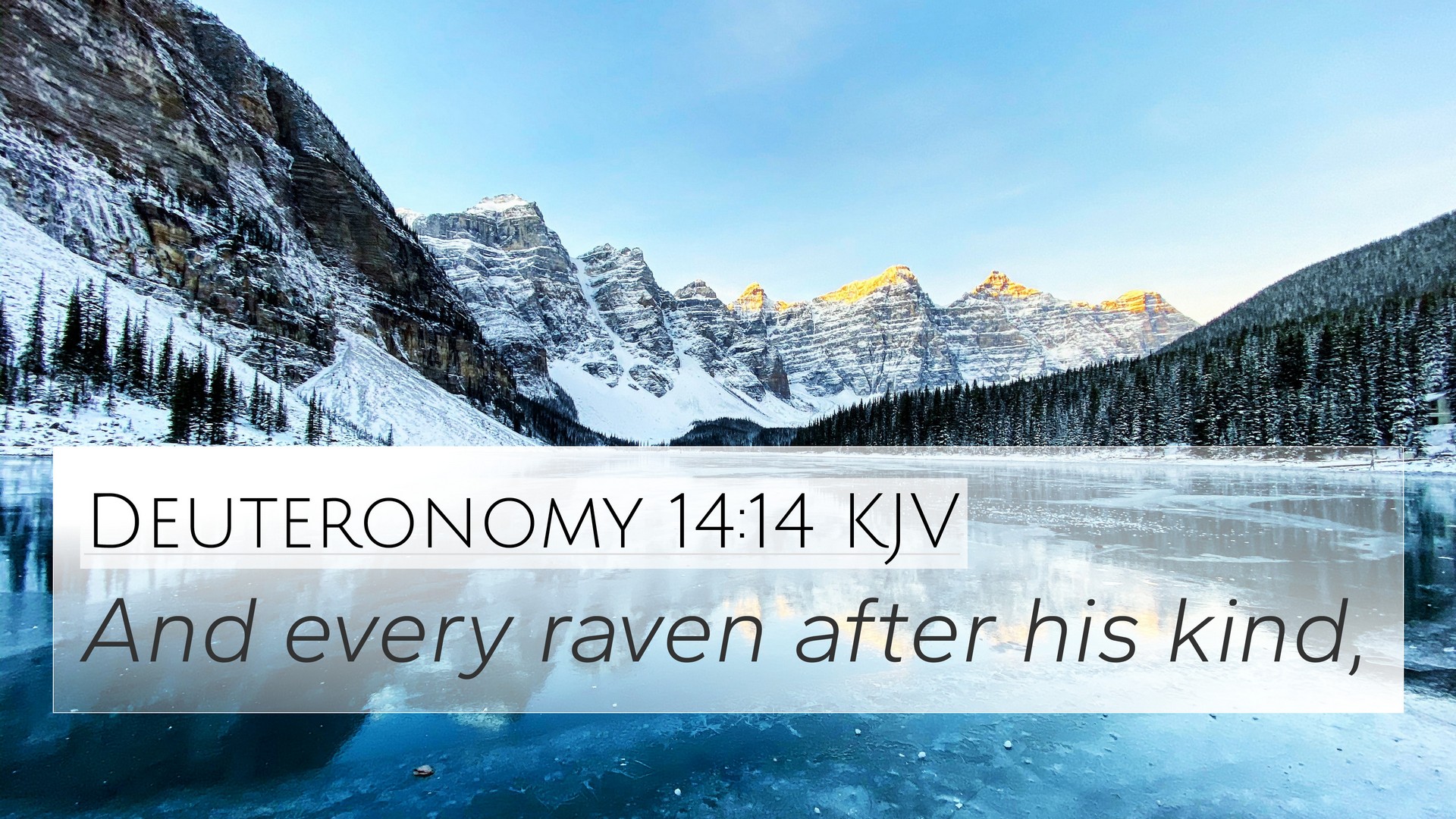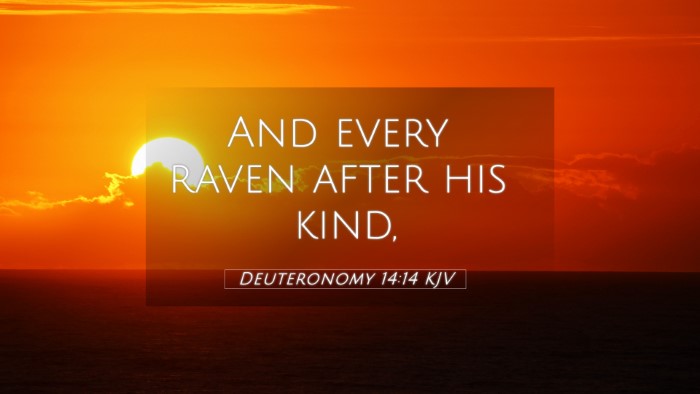Understanding Deuteronomy 14:14
Deuteronomy 14:14 states: "And every raven after his kind shall you abominate." This verse is part of the dietary laws given to the Israelites, emphasizing the importance of holiness and obedience in their lifestyle. Through comprehensive analysis by notable public domain commentaries such as those by Matthew Henry, Albert Barnes, and Adam Clarke, we uncover deeper insights into this scripture.
Insights from Public Domain Commentaries
Matthew Henry's Commentary
Matthew Henry emphasizes the concept of ritual purity and God’s commandments designed to keep the people distinct from other nations. The raven, being considered an unclean bird, symbolizes a broader principle of separating oneself from that which is deemed impure or sinful. This reflects God’s desire for His people to adhere to a standard of holiness, which is foundational to their covenant relationship.
Albert Barnes' Notes
Albert Barnes elucidates that God's prohibitions regarding certain animals, including the raven, were intended to encourage a spirit of dedication among the Israelites. By abstaining from certain foods, the people symbolize their continued commitment to adhere to divine law. He also interprets the raven's characteristics as representative of spiritual and moral decay, reinforcing the need for self-discipline and the rejection of that which corrupts.
Adam Clarke's Commentary
Adam Clarke offers a detailed cultural and historical context, noting that the raven is often associated with desolation and drought in the scriptures. Clarke posits that the exclusion of the raven aligns with a broader theme of God's provision for His people—the emphasis on clean animals includes practical considerations for health and sustenance. The act of abstaining signifies reliance on God’s intended path for nourishment and spiritual well-being.
Thematic Connections to Other Bible Verses
Deuteronomy 14:14 is interconnected with various Biblical themes and verses. These connections can be explored further using a range of cross-referencing techniques, allowing a deeper understanding of God's law and its implications for believers today.
Key Cross-References
- Leviticus 11:13-19: Details the unclean birds, including the raven, complementing Deuteronomy's dietary laws.
- 1 Kings 17:4-6: Illustrates God's provision through ravens, presenting a nuanced view of the raven's role in the Biblical narrative.
- Matthew 6:26: Jesus references birds to teach about trusting God's provision, contrasting with the idea of uncleanliness found in the Old Testament.
- Isaiah 34:11: Symbolically connects the raven with judgment, depicting it as a sign of desolation, further emphasizing its negative connotations.
- Psalms 147:9: Highlights God's care for the creatures, illustrating the dichotomy between their value and designation as unclean.
- Luke 12:24: Reinforces the idea of divine provision, suggesting that the distinction made in the Old Testament serves to guide in our understanding of our reliance on God.
- Acts 10:15: Peter’s vision challenges the notion of clean and unclean, bridging the dietary laws to New Testament revelations.
Conclusion
In summary, Deuteronomy 14:14 reveals profound details regarding the nature of God's commandments and their purpose in the life of an Israelite—simultaneously serving as a lesson on holiness, obedience, and the practical implications of divine laws. Through cross-referencing with related biblical passages, one can cultivate a more robust understanding of the interconnectedness of scripture, leading to a richer spiritual insight and application in today’s context.
Further Study Tools
For those seeking to understand Bible verses in a comprehensive way, consider utilizing:
- Bible Concordance: A valuable tool to find specific terms and their occurrences throughout the Bible.
- Bible Cross-Reference Guide: Helps to navigate connections between verses that share similar themes or teachings.
- Cross-Reference Bible Study: Techniques to explore relationships between Old and New Testament scriptures.
Exploring the Connections
There are various methods of cross-referencing Bible texts that highlight the underlying unity in scripture. Understanding these connections can enhance your study and interpretation of passages like Deuteronomy 14:14. By identifying the broader context and the thematic threads that weave through the Biblical narrative, you can appreciate the richness of God's word and its application in both ancient and modern faith contexts.


